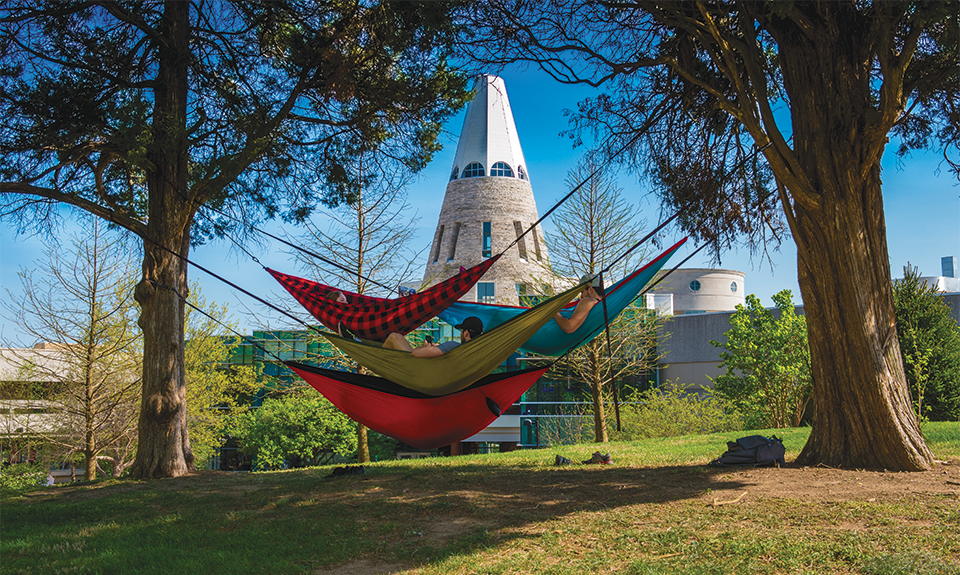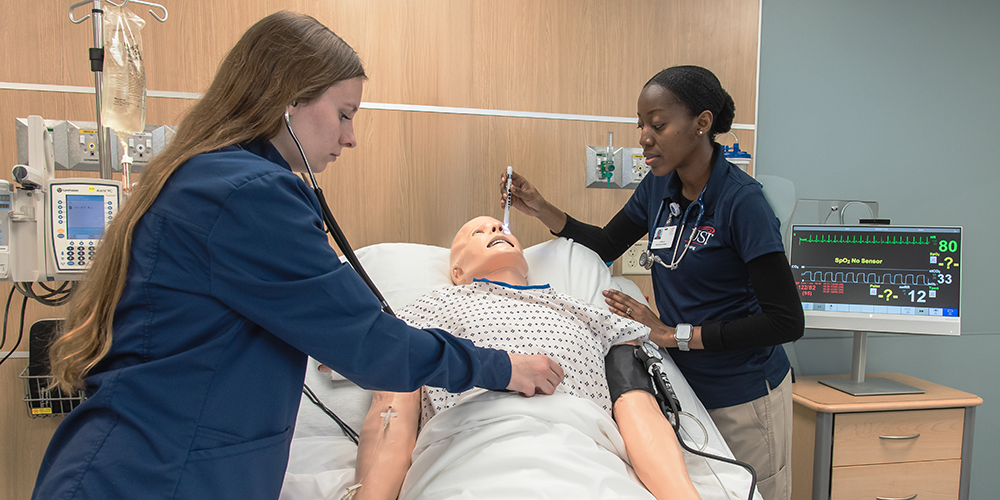USI’s BSN program provides you with a foundational understanding of evidence-based health care delivery and the importance of interprofessional collaboration. Emphasizing a hands-on experience, you’ll actively engage in over 1,197 clinical hours in many diverse clinical settings ranging from acute care to population based health. A 192-hour senior internship will immerse you in a clinical setting working one-on-one with an experienced registered nurse. On top of these experiences, you’ll also augment your clinical training in a state-of-the-art simulation center. Throughout your education, you’ll have personalized attention from award-winning faculty with many years of clinical experience. Located in Evansville, you’ll have the opportunity to gain clinical experience at two Magnet designated hospitals and a hospital devoted exclusively to women and neonates. Due to USI’s extensive number of clinical hours in all areas of nursing, you’ll be well prepared to transition into the registered nurse role.
USI’s first-time National Council Licensure Exam (NCLEX®) pass rate is consistently above the national average first-time pass rate. According to the newest 2023-24 National Council for State Boards of Nursing (NCSBN) report, USI is tied for first in pass rates for the NCLEX out of 52 registered nurse programs in Indiana having at least 10 graduates take the exam during the reporting period and tied for first nationally in terms of pass rates out of 2,226 RN programs.
USI nursing students will complete clinical experiences in a variety of healthcare and community settings. In order to optimize clinical learning experiences, students may be required to travel up to 70 miles and provide their own transportation to assigned agencies or institutions.
Direct admission applies only to students who are first-time degree seeking students and who are applying within the first calendar year of high school graduation.
How do I qualify?
To qualify for direct admission, students must have both:
To maintain direct admission status, students must:
Students will work closely with an advisor to determine an individual schedule.
Standard Admission to the undergraduate nursing program may occur after completion of 31 hours of required university courses. Students accepted through the standard admission process must maintain eligibility.
Admission to the program is based upon the following:
Required Admission Prerequisite Courses
To be eligible for admission to the Nursing program, all students must have a 2.8 cumulative GPA of required admission prerequisite courses. Students must receive a grade of "C" or better in these courses:
Additional Prerequisite Courses
Science Eligibility Rule:
Students with three or more failures (a "D" or "F") in any of the required science courses are ineligible for the Nursing program at USI. Anatomy & Physiology and Chemistry course credit must be earned or equivalent competence demonsstrated, within five (5) years of enrollment in clinical nursing courses.
Required Progression Courses (Before First Semester of Nursing, with grade of "C" or better)
Required Second Semester Nursing Progression Courses
To apply to the University of Southern Indiana (USI) for undergraduate enrollment:
Once USI has processed your application, transcript(s) and scores (if needed), a decision will be made by Undergraduate Admissions and you will receive a notification.
Upon acceptance to USI, you'll receive detailed information about next steps, including orientation, registration and housing.
Non-native speakers of English must meet English proficiency requirements as established by the USI Center for International Programs.
There is a Secondary Application Process
to be Accepted into the Undergraduate Nursing Program
Students may declare a major in pre-Nursing upon entering the university or complete a change of major form at any point in time.
There are two entry points for you to start earning your undergraduate nursing degree at USI:
For more information about both admission options, return to the BSN homepage.
The career outlook for someone with a Bachelor of Science in Nursing (BSN) is very positive. Nurses are in high demand across the country, and this demand is expected to grow. The U.S. Bureau of Labor Statistics projects a 6% growth in employment for registered nurses (RNs) from 2022 to 2032, which is faster than the average for all occupations.
*income information provided by O*NET Online. Occupation opportunities vary by region and experience.
The University of Southern Indiana is committed to making college accessible to those wishing to further their education by providing numerous scholarships, grants, and financial aid options to assist students in managing tuition expenses.
 The baccalaureate degree program in nursing, master's degree program in nursing, Doctor of Nursing Practice program and/or post-graduate APRN certificate program at the University of Southern Indiana are accredited by the Commission on Collegiate Nursing Education (http://www.ccneaccreditation.org).
The baccalaureate degree program in nursing, master's degree program in nursing, Doctor of Nursing Practice program and/or post-graduate APRN certificate program at the University of Southern Indiana are accredited by the Commission on Collegiate Nursing Education (http://www.ccneaccreditation.org).
USI's Bachelor of Science in Nursing (BSN) program is accredited by the Indiana State Board of Nursing.
Requirements for licensure and certification vary by profession and by state. USI has reviewed the educational requirements for each state and licensing agency to determine if the academic program here at USI meets the educational requirements to be eligible for licensure/certification in each state or not. Please note that some states may have additional requirements for licensure, such as residency requirements, additional non-academic certifications, etc. that USI cannot determine. We encourage you to check with your state's licensing agency for all requirements needed to obtain licensure.


